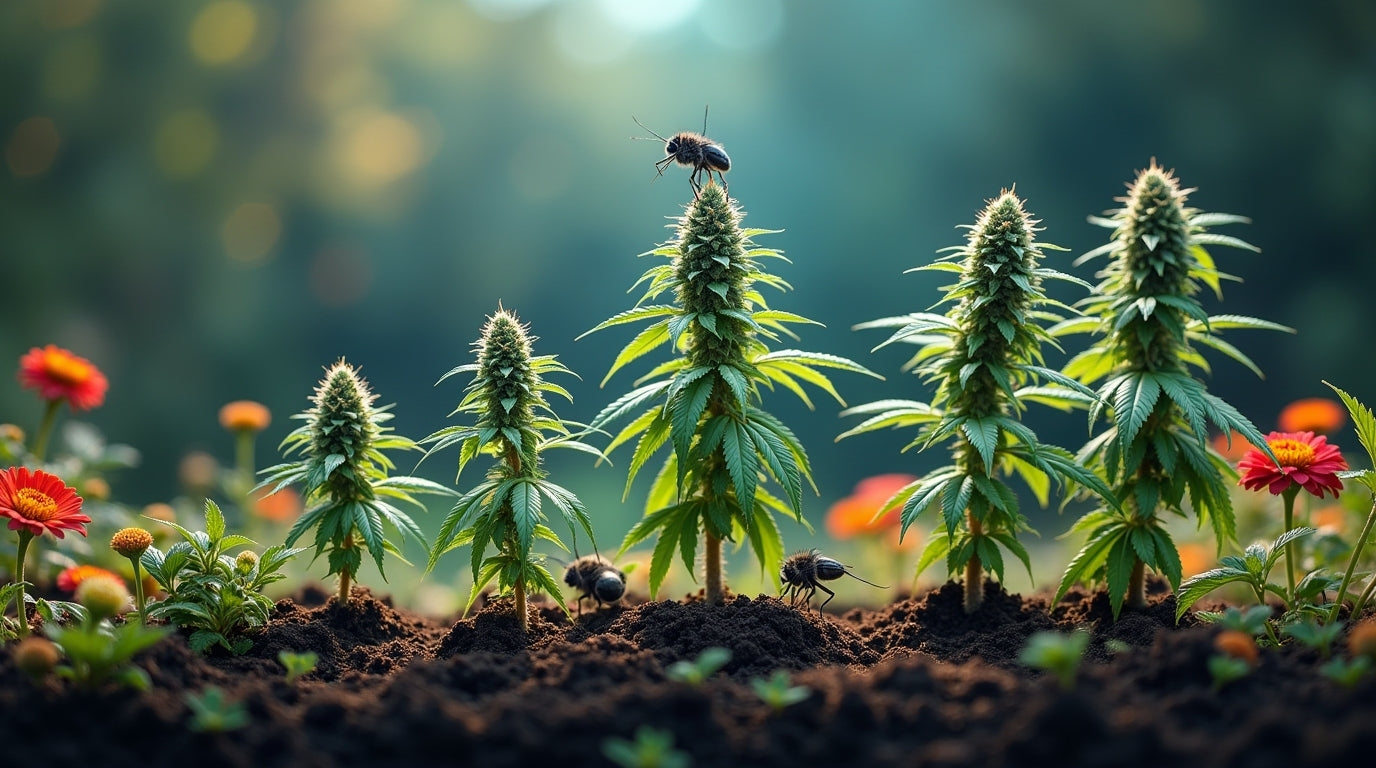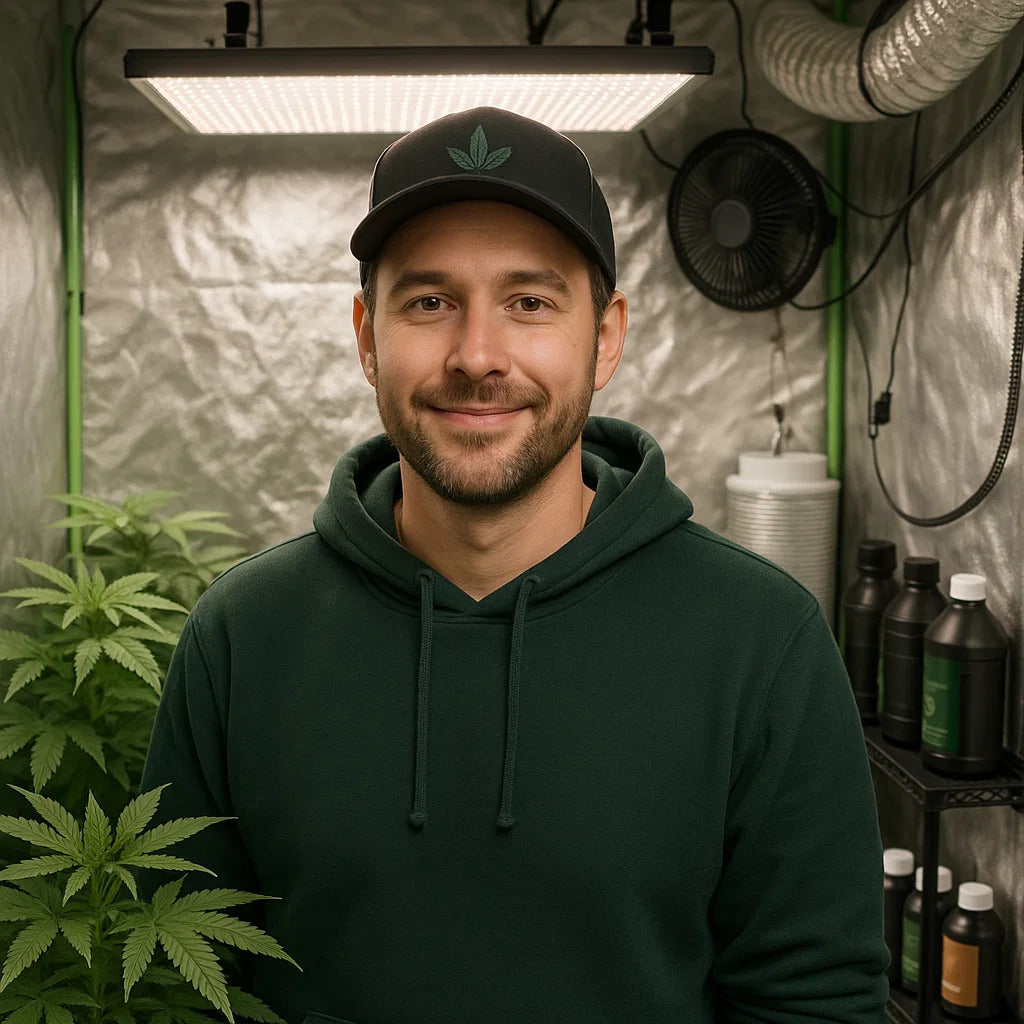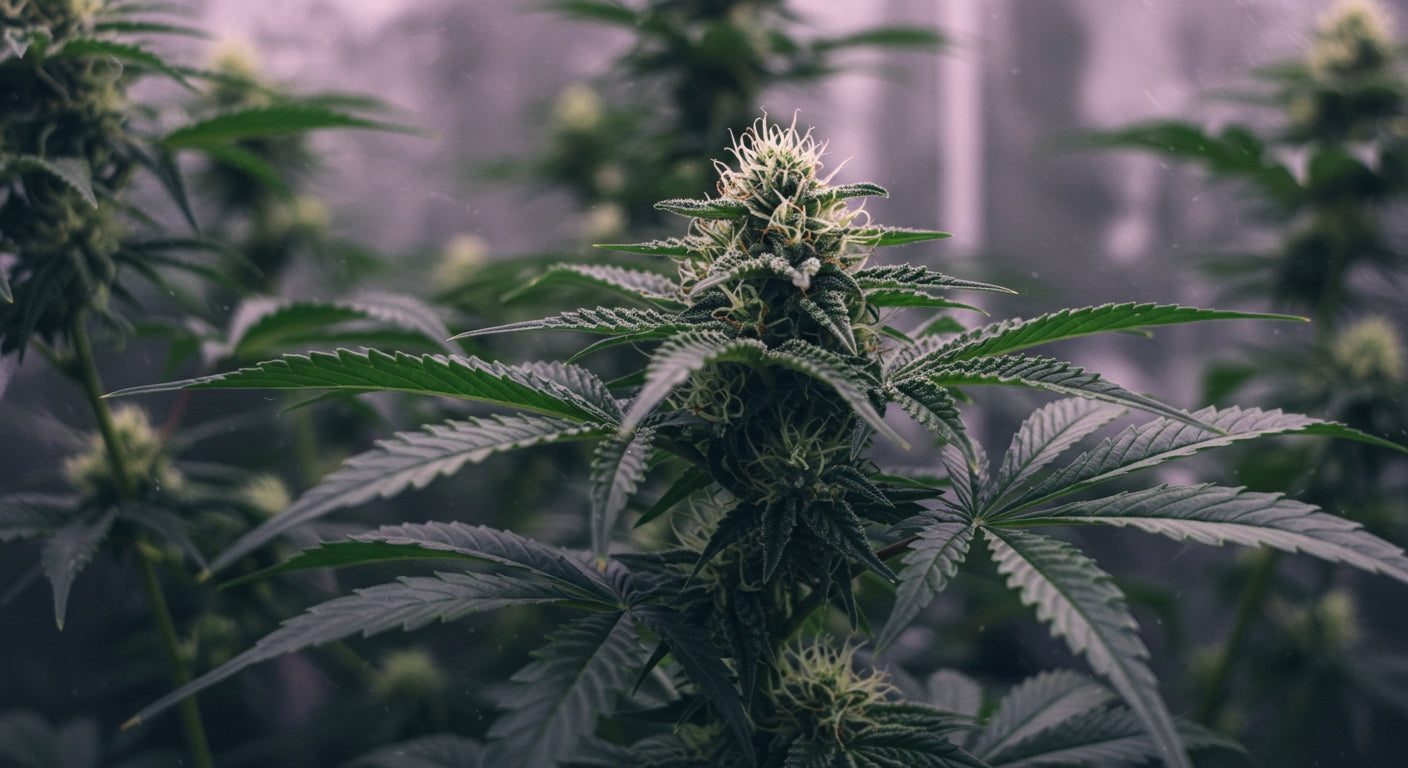
How Long to Grow Cannabis: Your Complete Timeline Guide from Seed to Harvest
Growing cannabis is a time investment that varies significantly based on your chosen methods, strain genetics, and growing conditions. Understanding the complete timeline helps you plan harvests, manage expectations, and optimize your growing schedule for consistent results. Most new growers either underestimate the time commitment or become impatient during longer growth phases.
The total time to grow cannabis typically ranges from 3-8 months, depending on whether you're growing autoflowering varieties, photoperiod strains, or starting from clones versus seeds. Indoor controlled environments generally offer more predictable timelines compared to outdoor growing, which depends on natural seasons and climate conditions.
This comprehensive guide breaks down every stage of the cannabis growing timeline, from germination through harvest and curing. With proper planning and controlled growing environments, you can optimize your growing schedule for maximum efficiency and quality results.
Complete Cannabis Growing Timeline Overview
Seed to Harvest: Standard Timeline
Total Growing Time: 4-7 Months
Germination: 3-7 days Seedling Stage: 2-3 weeks Vegetative Growth: 4-8 weeks Flowering: 8-12 weeks Harvest & Drying: 1-2 weeks Curing: 4-8 weeks
Clone to Harvest: Accelerated Timeline
Total Growing Time: 3-5 Months
Clone Establishment: 1-2 weeks Vegetative Growth: 2-6 weeks Flowering: 8-12 weeks Harvest & Drying: 1-2 weeks Curing: 4-8 weeks
Autoflowering Timeline: Fastest Option
Total Growing Time: 2.5-4 Months
Germination: 3-7 days Seedling: 1-2 weeks Vegetative: 2-4 weeks Flowering: 6-8 weeks Harvest & Drying: 1-2 weeks Curing: 4-8 weeks
The key difference is that autoflowering strains have fixed lifecycles regardless of light schedule, making them ideal for compact grow tent setups and quick harvests.
Detailed Growth Stage Timelines
Germination Phase (3-7 Days)
Day 1-2: Seed activation begins Day 3-5: Taproot emergence (most seeds) Day 6-7: Late germination (slower seeds)
Factors Affecting Germination Time:
- Seed freshness: Fresh seeds germinate faster
- Temperature: 70-75°F optimal for quick germination
- Moisture levels: Consistent moisture without oversaturation
- Genetics: Some strains naturally germinate slower
Germination Methods:
- Paper towel method: 24-48 hours typically
- Direct soil: 3-7 days for emergence
- Water glass method: 12-24 hours before transferring
Seedling Stage (2-3 Weeks)
Week 1:
- Cotyledons emerge and open
- First true leaves begin developing
- Root system establishment
Week 2:
- First serrated leaves appear
- Photosynthesis becomes primary energy source
- Rapid leaf development
Week 3:
- Multiple leaf sets developed
- Stem thickening begins
- Transition to vegetative growth
Critical Factors:
- Environmental stability: Consistent temperature/humidity
- Gentle lighting: Avoid burning delicate seedlings
- Proper watering: Overwatering kills more seedlings than drought
A properly configured grow tent provides the stable environment essential for healthy seedling development.

Vegetative Stage (4-8 Weeks)
Week 4-5 (Early Vegetative):
- Rapid height and leaf development
- Strong root system expansion
- Begin training techniques if desired
Week 6-7 (Mid Vegetative):
- Explosive growth phase
- Pre-flowering preparation
- Optimal time for major training
Week 8-10 (Late Vegetative):
- Final size development
- Prepare for flowering transition
- Complete training and pruning
Vegetative Duration Factors:
- Desired plant size: Longer veg = larger plants
- Training methods: More training extends vegetative time
- Space limitations: Container size affects growth rate
- Genetic factors: Sativas often need longer vegetative periods
Accelerated Vegetative Growth:
- Optimal lighting: 18/6 schedule with quality LEDs
- Proper nutrition: Nitrogen-rich vegetative nutrients
- Environmental control: 75-85°F with 50-60% humidity
- CO2 supplementation: Can increase growth rates 20-30%
Flowering Stage (8-12 Weeks)
Week 1-2 (Transition):
- Switch to 12/12 light schedule
- Flowering stretch begins
- Gender identification (if growing regular seeds)
Week 3-4 (Early Flowering):
- Rapid height increase (50-200%)
- Initial bud formation
- Pistil development
Week 5-6 (Mid Flowering):
- Bud expansion and development
- Trichome production begins
- Aroma development
Week 7-8 (Late Flowering):
- Peak bud development
- Maximum trichome production
- Prepare for harvest evaluation
Week 9-12 (Final Maturation):
- Monitor for harvest readiness
- Flush nutrients if desired
- Final resin production
Flowering Duration by Strain Type:
- Indica-dominant: 7-9 weeks typically
- Sativa-dominant: 9-14 weeks often
- Hybrid strains: 8-11 weeks average
- Autoflowers: 6-8 weeks regardless of light
Factors Affecting Growing Time
Environmental Conditions
Temperature Impact:
- Optimal range: 70-85°F for fastest growth
- Too cool: Slower metabolism and growth
- Too hot: Stress responses slow development
- Consistency: Stable temperatures promote predictable timing
Lighting Effects:
- Intensity: Higher PPFD accelerates growth
- Duration: Longer photoperiods extend vegetative time
- Quality: Full spectrum supports optimal development
- Consistency: Reliable schedules prevent stress delays
Humidity Considerations:
- Vegetative: 50-70% RH for optimal growth
- Flowering: 40-50% RH prevents mold delays
- Transpiration: Proper humidity optimizes nutrient uptake
- Air circulation: Prevents stagnant conditions
Environmental control systems allow you to maintain optimal conditions throughout the growing cycle.
Genetics and Strain Selection
Indica vs. Sativa Timing:
- Indica strains: Faster flowering (7-9 weeks)
- Sativa strains: Longer flowering (10-14 weeks)
- Hybrid varieties: Moderate timing (8-11 weeks)
- Landrace strains: Often longer, more variable timing
Specific Strain Examples:
- Northern Lights: 7-9 weeks flowering
- Sour Diesel: 10-11 weeks flowering
- Blue Dream: 9-10 weeks flowering
- Granddaddy Purple: 8-11 weeks flowering
Autoflowering Genetics:
- Ruderalis influence: Fixed lifecycle genes
- Typical timeline: 8-12 weeks seed to harvest
- No photoperiod dependence: Flowers automatically
- Compact size: Often smaller plants
Growing Method Impact
Soil vs. Hydroponic:
- Soil growing: Moderate growth rates, longer timelines
- Hydroponic systems: Faster nutrient uptake, shorter timelines
- Soilless media: Intermediate growth rates
- Organic vs. synthetic: Synthetic often faster
Container Size Effects:
- Small containers: Limit growth rate and final size
- Large containers: Support faster, larger growth
- Root binding: Slows growth significantly
- Transplanting: Can accelerate or slow growth
Training Technique Impact:
- No training: Fastest natural growth
- LST/Bending: Minimal time impact
- Topping/FIMing: Adds 1-2 weeks recovery
- SCROG: May extend vegetative time
- Supercropping: Requires recovery time

Indoor vs. Outdoor Growing Timelines
Indoor Growing Advantages
Controlled Timeline:
- Year-round growing: Not limited by seasons
- Consistent conditions: Predictable growth rates
- Flexible scheduling: Start anytime
- Multiple harvests: 3-4 cycles per year possible
Typical Indoor Timeline:
- Germination to harvest: 16-24 weeks
- Harvest frequency: Every 3-4 months
- Perpetual harvests: Staggered plant schedules
- Seasonal independence: Consistent year-round production
Outdoor Growing Considerations
Season-Dependent Timeline:
- Spring start: April-May in Northern Hemisphere
- Summer vegetative: June-August growth
- Fall flowering: September-November harvest
- Single annual harvest: One crop per year
Outdoor Timeline Factors:
- Latitude: Higher latitudes have shorter seasons
- Climate: Warmer climates extend growing season
- Daylight patterns: Natural photoperiod changes
- Weather: Unpredictable conditions affect timing
Greenhouse Growing:
- Extended seasons: Earlier starts, later harvests
- Weather protection: More consistent conditions
- Light supplementation: Control photoperiods
- Climate control: Optimize growing conditions
Optimizing Growing Time
Accelerating Growth
Environmental Optimization:
- Ideal temperature: 75-85°F vegetative, 70-80°F flowering
- Proper humidity: 60-70% veg, 40-50% flower
- CO2 supplementation: 1000-1500 PPM during peak growth
- Quality lighting: High PPFD with proper spectrum
Nutritional Acceleration:
- Optimal feeding: Provide adequate nutrients without excess
- pH management: Maintain 6.0-7.0 soil, 5.5-6.5 hydro
- Consistent watering: Prevent drought stress
- Supplemental nutrients: Beneficial additives for growth
Technique Optimization:
- Proper training: Maximize light exposure
- Pruning timing: Strategic removal for better development
- Transplanting: Upgrade containers before root binding
- Strain selection: Choose faster-finishing varieties
Managing Longer Timelines
Patience Strategies:
- Realistic expectations: Plan for full timeline
- Multiple plants: Stagger starts for continuous harvest
- Proper planning: Prepare for extended timeframes
- Quality focus: Longer times often mean better quality
Timeline Planning:
- Calendar tracking: Mark important dates
- Supply planning: Ensure adequate nutrients/supplies
- Equipment maintenance: Service during transitions
- Harvest preparation: Plan drying/curing space
Common Timeline Mistakes
Rushing the Process
Premature Harvesting:
- Reduced potency: THC not fully developed
- Poor quality: Immature trichomes
- Lower yields: Buds not fully formed
- Harsh smoke: Inadequate development
Insufficient Vegetative Time:
- Smaller plants: Reduced final yields
- Weak structure: Poor support for heavy buds
- Stress susceptibility: Underdeveloped root systems
- Training limitations: Insufficient time for techniques
Unrealistic Expectations
Beginner Mistakes:
- Underestimating time: Expecting faster results
- Neglecting curing: Rushing post-harvest process
- Inconsistent care: Irregular maintenance schedules
- Poor planning: Inadequate preparation
Professional Timing:
- Consistent schedules: Regular maintenance routines
- Proper documentation: Track growth progress
- Quality over speed: Prioritize results over timeline
- Preparation focus: Plan for entire timeline
FAQ Section
Q: How long does it take to grow cannabis from seed to harvest? A: Cannabis typically takes 4-7 months from seed to harvest. This includes 3-7 days germination, 2-3 weeks seedling stage, 4-8 weeks vegetative growth, 8-12 weeks flowering, plus 1-2 weeks drying. Autoflowering strains are faster at 2.5-4 months total.
Q: What's the fastest way to grow cannabis? A: Start with established clones (saves 2-4 weeks), use autoflowering strains (fixed 10-12 week cycles), optimize environmental conditions, and choose fast-finishing indica-dominant varieties. Hydroponic systems can also accelerate growth rates.
Q: How long is the flowering stage for most cannabis strains? A: Most cannabis strains flower for 8-12 weeks. Indica-dominant strains typically finish in 7-9 weeks, while sativa-dominant varieties often take 10-14 weeks. Hybrid strains usually fall in the 8-11 week range.
Q: Can you speed up cannabis flowering time? A: You cannot significantly speed up flowering time as it's genetically determined. However, optimal environmental conditions, proper nutrition, and choosing naturally fast-finishing strains can ensure plants reach their genetic potential quickly.
Q: How long should you cure cannabis after harvest? A: Cure cannabis for at least 4-8 weeks for optimal flavor and potency. While technically ready after 2-4 weeks, longer curing (up to 6 months) continues to improve quality. Proper curing is essential for the best final product.
Featured Snippet Summary
How long to grow cannabis: Cannabis takes 4-7 months from seed to harvest, including 3-7 days germination, 2-3 weeks seedling stage, 4-8 weeks vegetative growth, 8-12 weeks flowering, and 4-8 weeks curing. Autoflowering strains are fastest at 2.5-4 months total. Indoor growing offers more predictable timelines than outdoor cultivation.
Maximize Your Growing Timeline Efficiency
Understanding cannabis growing timelines is crucial for planning successful harvests and maintaining consistent supply. Whether you're growing for personal use or planning multiple harvests throughout the year, having the right environment and equipment ensures you can achieve optimal timing every time.
Gorilla Grow Tents provide the controlled environment essential for predictable growing timelines. With precise environmental control, adjustable height systems that accommodate growth spurts, and durable construction that supports multiple growing cycles, you can optimize your timeline for maximum efficiency.
The consistent conditions provided by professional grow tent systems eliminate the environmental variables that can extend growing timelines or cause delays. From maintaining perfect seedling conditions to supporting rapid vegetative growth and optimal flowering, controlled environments ensure your plants reach their potential on schedule.
Whether you're planning compact autoflower cycles for quick harvests or large-scale operations with extended timelines, having reliable equipment ensures your growing schedule stays on track harvest after harvest.
Don't let environmental inconsistencies disrupt your growing timeline. Explore our complete growing systems and discover why serious growers trust Gorilla for consistent, predictable results throughout every stage of the growing cycle.
Ready to optimize your growing timeline for maximum efficiency? Learn about setting up the perfect grow environment and environmental control techniques that ensure your plants stay on schedule from seed to harvest.

Lena Myles
I'm a mushroom enthusiast and home cook based in Oregon. I'm passionate about foraging and creating fungi-focused recipes, especially delicious, plant-based dishes using gourmet mushrooms like trumpet, shiitake, and oyster. When I’m not in the kitchen, you’ll usually find me wandering the woods in search of new wild flavors.


